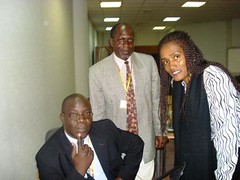WITFOR sessions illustrate innovative concrete ICT applications in agriculture
 Addis Ababa, 25 August 2007: Speakers from 10 countries shared insights and experiences at the recent World Information Technology Forum (WITFOR) Agriculture Session meetings.
Addis Ababa, 25 August 2007: Speakers from 10 countries shared insights and experiences at the recent World Information Technology Forum (WITFOR) Agriculture Session meetings.A diverse range of experiences was presented and discussed; altogether demonstrating the rapid developments in the field and several concrete applications of ICTs in agriculture, rural development and related areas. It seems that ICTs are helping to put m oney in farmers' pockets. All the presentations focused on ‘agricultural’ and ‘developmental’ challenges, showing how ICTs as well as information, knowledge and communication processes make a difference.
The examples shared show that ICT's are being used in rural areas:
- To power e-commerce marketplaces for farmer cooperatives (the Philippines); connecting buyers and sellers and enabling efficient transactions.
- To automate and enable financial transactions of cooperatives, provide local ‘b2b’ centers for farming communities, and provide mobile banking services to individual farmers (Philippines).
- To help revolutionize Ethiopian agriculture by providing more efficient marketing systems for agricultural commodities; “From a sack of grain to a sack of money”!
- To support the social and economic fabric of rural villages and communities (Hungary); providing services and employment otherwise not available.
- To inform planning, land use, and tree planting decisions in Ethiopia. Land suitability is mapped with GIS to guide decisions on investment (where to plant interesting economic plants) and conservation (what is happening to the forest zone where coffee originated).
- As part of phytosanitary and farm monitoring and traceability systems to track and certify the quality of agricultural export products; without this, farmers would lose access to foreign markets and perhaps their livelihoods (Jamaica).
- To help safeguard agricultural biodiversity by providing access to catalogues, indexes, and maps of plant seeds and their characteristics. Such genebanks were used to replenish seed lost in recent Mozambique floods.

Three of the speakers - Justin Chisenga (FAO), Barnabas Kapange (SADC Plant Genetic Resources Centre), and Dionne Clarke-Harris (CARDI).
The examples also show that ICT's are being used by the agricultural development community:
- As a platform to share experiences among development practitioners (India). Community of practice members contributed their insights on agricultural extension to make future investments more effective; discussions on school meals and nutrition led to real collaborative pilot projects.
- As a knowledge sharing and exchange tool among people working on IFAD-sponsored projects in the Middle East and North Africa.
- To reinforce communication among agricultural information specialists worldwide.
- As a platform to globally document and exchange innovative uses of information and knowledge and ICTs – e-agriculture.
Several speakers, while discussing national initiatives, highlighted the regional perspective and crossovers with other countries; conversely, the important role of local communities themselves as important actors in disseminating information locally was emphasized. Given the ongoing changes to our climate - and the important role of weather in farming - it was suggested that agricultural information systems need to better connect to and use weather and climate-related information, observations, and data.
This final issue raised concerned scale. Where scale is small (thousands of farmers rather than hundreds of thousands or millions), it wa suggested that entrepreneurs and investors might be less eager to invest in ICT-enabled applications for rural communities and therefore that other approaches might be needed.
More on the Forum: www.witfor.org / reports from WITFOR agriculture commission
Labels: aginfo, agriculture, ICT, information, knowledge_sharing, witfor






0 Comments:
Post a Comment
<< Home